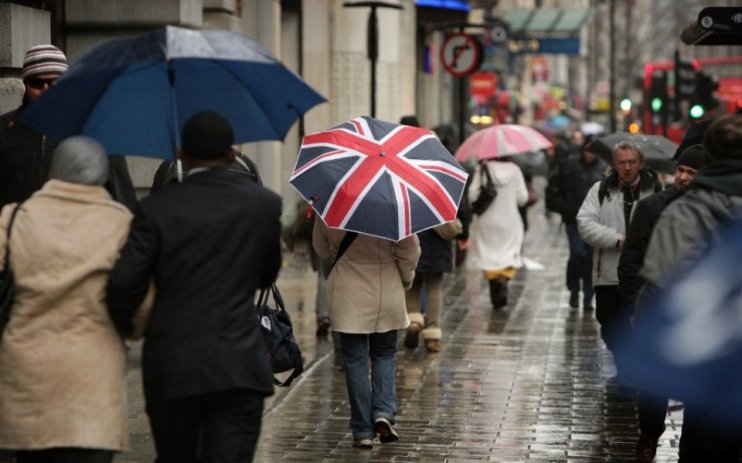Analysts: UK economy ‘like a punchdrunk boxer hanging off the ropes’

UK’s GDP shrank by 2.9 per cent in January, it was announced this morning, blowing a “cold snap” through the UK economy as a third national lockdown was imposed.
Analysts were torn as to whether the harsh fall is a glass of cold water to the face, or better than what was forecast.
January’s figures were a “cold snap”, as the economy was already feeling the effects of a historic contraction due to the pandemic, Susannah Streeter, senior investment and markets analyst at Hargreaves Lansdown, said this morning.
Meanwhile, associate director for personal investing at Fidelity International, Ed Monk, described the 2.9 per cent hit as “sobering”, adding that “the decline in Covid-19 cases to a level where restrictions can end can’t come soon enough.”
Despite the 9 per cent drop below its January 2020 level, Redburn’s chief economist Melissa Davies called the activity “reassuring at face value”.
“Activity was down ‘only’ 2.9 per cent on the month, and 9 per cent year on year. The stats office has made adjustments to take account of the vaccination programme and test and trace, lifting GDP by almost a percentage point,” Davies said.
Third lockdown impact
For Suren Thiru, head of economics at BCC, the data is not as chilling considering the colliding impacts of a third lockdown and Brexit.
“The latest data confirms a better than expected start to the year for the UK economy as the third lockdown and post-Brexit border disruption combined to trigger only a relatively modest decline in economic activity in January,” Thiru explained.
Over at INFINOX, Ulas Akincilar, the firm’s head of trading, agreed with Thiru, adding that the contraction is less than previous projections.
“The UK economy may look like a punchdrunk boxer hanging off the ropes, but the blows are doing less damage each time,” Akincilar said.
“January’s sharp decline in output would be painful at any time. But compared to the collapse triggered by the first nationwide lockdown, this latest contraction is modest and far less than feared.”
Brexit
Post-Brexit trading contractions are set to make the first quarter of this year even tougher to navigate, Davies said.
“While Q1 will be a tough quarter overall, the UK is on the road to recovery, albeit a long one. It will be some time before we can assess the ‘cruising’ speed of the economy, post furlough, and the behaviour of households as regards spending their savings,” Davies contined.
The collision of lockdown and Brexit meant January took a “double hit”, chief economist at KPMG UK, Yael Selfin, has said.
“January saw a staggering 40.7 per cent fall in exports to the EU as the Brexit related disruption coincided with restrictions caused by new Covid variants.
“The manufacturing sector, and in particular the automotive industry, suffered from initial border glitches, while the transport sector was also affected,” Selfin said.
Although adjustments in data collection limit the ability to make historic comparisons, Thiru warned the trading drop would be a sign of what is to come.
“The significant slump in UK exports of goods to the EU, particularly compared to non-EU trade, provides an ominous indication of the damage being done to post-Brexit trade with the EU by the current border disruption,” Thiru said.
Thiru suggested the government postpone import checks to ease the border friction and bring a minor boost to the UK economy.
“The practical difficulties faced by businesses on the ground go well beyond just teething problems and with disruption to UK-EU trade flows persisting, trade is likely to be a drag on UK economic growth in the first quarter of 2021,” Thiru added.
“There must be a greater focus on long-term solutions to improving the flow of UK-EU trade.”
Recovery
The road to recovery remains “arduous”, Streeter said, the latest lockdown acts as “another big pothole to manoeuvre around”.
However, retail may hold a breath of relief as the world begins to open up again.
“As people have hibernated at home, with social lives on hold, many savers have been squirreling away record amounts of cash. That huge piggy bank is likely to be cracked open when retail and hospitality fling open their doors once more,” Streeter added.
Alongside the long-awaited return of retail, the vaccine rollout will welcome another lift to output.
“The vaccine rollout and budget stimulus will boost output as restrictions ease. However, the lingering economic effects of covid, including elevated consumer and business debt levels, may severely limit the pace of any recovery,” Thiru said.
Streeter added: “The rapid roll out of vaccines is also helping by instilling a big dose of confidence, which should add to the economic rebound once restrictions are finally eased.’’
Selfin agreed, adding that once restrictions are eased, KPMG expects a growth of 4.6 per cent this year.